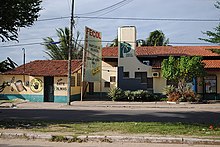Banco Palmas
Banco Palmas is a Brazilian community bank founded in 1998 in Conjunto Palmeiras, a neighborhood of 32,000 inhabitants located in the suburbs of Fortaleza - Ceará, Brazil operating under the principle of the "Solidarity Socio-Economy."
Its mission is to implement programs and projects for work and income generation using solidarity economy systems primarily focused on overcoming urban and rural poverty.
Its objective is to ensure micro-credits for local production and consumption with low interest rates and no requirements for registration, proof of income, or guarantor, (the neighbors guarantee the borrower's reliability).
Due to redevelopment initiatives along the coast of the city enacted by the municipal government, fishing communities and other inhabitants were uprooted and forced to move inland.
The inland district, known today as Conjunto Palmeira, was devoid of basic infrastructure such as water, roads, and electricity, thereby leaving the neighborhood vulnerable to floods and other natural and economic stability problems.
As such, Banco Palmas was created as a popular finance tool operating under the principles and values of the solidarity economy.
One year later, in September 2004, the second CDB opened under the name Banco Par, in the municipality of Paracuru, Ceará, 70 kilometers from Fortaleza.
In January 2006, Banco Popular do Brasil became a partner of the Brazilian Network of Community Development Banks as a guarantor of credit lines to the CDBs, through an agreement with the National Secretariat of Solidarity Economy (Secretaria Nacional de Economia Solidaria do MTE).
The main theory behind Banco Palmas, its actions, its achievements, and its history, is that an inherently economically poor territory (be it neighborhood, region, or municipality) does not exist.
Microcredits are given to those who normally cannot access "official" sources of funding because of bureaucracy; guarantor, income level, and asset requirements; and other banking regulations.
Forms of Microcredit 1. Credit for Production, Consumption, or Service For the improvement or creation of both formal and informal small businesses.
“Casa Produtiva” Instant credit for the purpose of home renovation, with the objective to create or improve an income generating enterprise.
4. Credit for Local Consumption Disbursed in social currency palmas in the maximum amount of R$600 payable in up to four payments with no interest.
It acts as an umbrella organization by managing the network and providing legal support to all community banks, many of which are just “local associations” with no institutional structure.
Cooperation with the Central Bank has grown in the last four years, culminating in November 2009 with the announcement of a new partnership between Banco Palmas and the Central Bureau of Solidarity Economy/ Federal Minister of Work (Secretaria Nacional de Economia Solidáriao-SENAES/Ministério do Trabalho do Governo Federal) to create an official bill for the social currencies, thereby creating a sort of “official position” of the Brazilian government on local circulating monies.
Its management involves a shared dimension with strong components of local social control, based on the mechanisms of direct democracy.
Because of its condition as a citizen's initiative focused on the development of the area, CDBs are aimed at a public characterized by a high degree of social vulnerability in particular, including (but not limited to) women, youth, merchants, new entrepreneurs, etc.
Bairro Escola de Trabalho is a project of practical training, employment and income generation for youth aged 16 to 24 years old in which neighborhood businesses (commercial, service, etc.)
It is believed that community-strengthening actions such as these have reduced rates of violence among young people from the moment they find themselves valued and integrated into the social and economic life of the community which is simultaneously responsible for the well-being of the region where they live.
Through its music, the Bate Palmas Company represents the culture and the history of the neighborhood while also representing the principles of the solidarity economy movement through the manufacturing and selling of its own artistic and cultural products, including musical instruments, CD recordings, art workshops, and shows and other artistic performances.
The result is always a show full of rhythms with the influence of various types of music such as Coco, Frevo, Bumba-Meu-Boi, Maracatu, Ciranda, Rap, Going, Carimbó, Rock, Reggae, Samba, Baião and others.
The aim of the Academy of Fashion is to improve the technical and professional skills of women and youth in the outskirts of the city through social inclusion based on principles of the solidarity economy.
The school is responsible for managing general knowledge about Banco Palmas, including developing teaching materials, publications, and reports.
It offers students theoretical knowledge to pass the college entrance exam, development of entrepreneurial skills, and general awareness of participation in community activities and environmental protection.
In June 2009, the community started having discussions about violence in the neighborhood, both regarding the police approach towards this problem, as well as the obvious correlation between drug use and crime.
Squares were remodeled, walls have been restored and decorated, training courses were planned and executed, and an art space for young people was created, “Palmeira das Artes.” PalmaTur is an inn under the solidarity network of Banco Palmas which promotes alternative, urban community tourism.
It was initially created by 20 neighborhood women trained by Instituto Palmas's Incubadora Feminina program to provide services in tourism and retail.
The idea behind PalmaTur is that there exists a Fortaleza beyond the Beira mar; the outskirts of the city too have many features worthwhile for tourists and new residents alike.
PalmaLimpe produces cleaning materials: detergent, disinfectant, bleach, fabric softener and liquid wax, and is composed of youth from the community.











